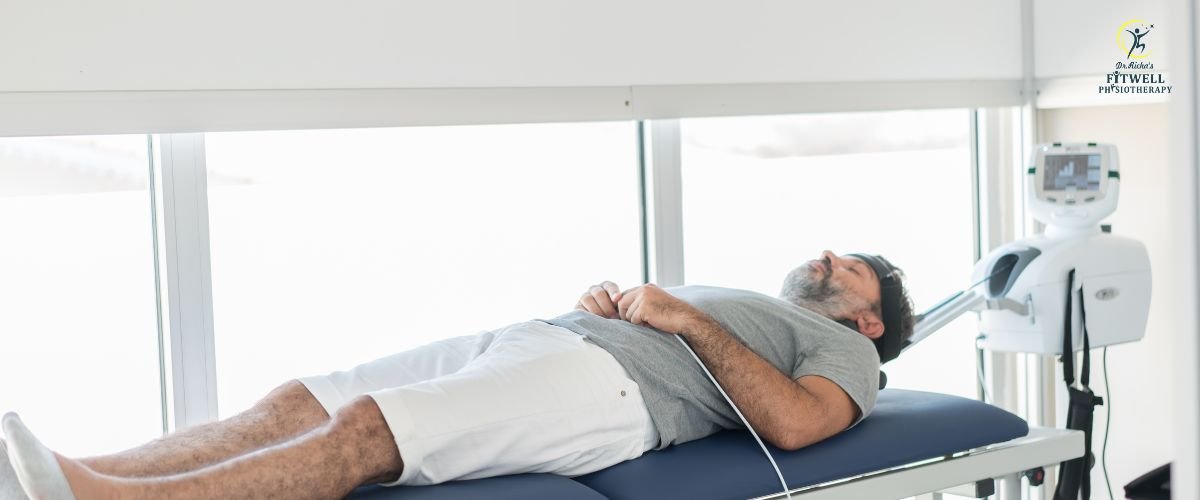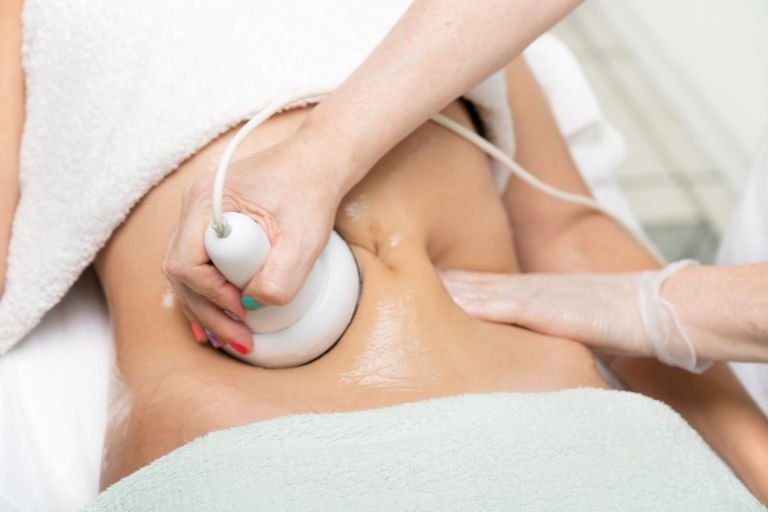- Fitwell Physiotherapy
Traction Therapy

Traction therapy is a form of physical therapy used to treat musculoskeletal conditions, particularly those affecting the spine. It involves applying a pulling force to the spine or other body parts to relieve pressure on the joints, nerves, and discs, thereby reducing pain and promoting healing. Here’s a breakdown of traction therapy:
Please submit your details below.
Types of Traction Therapy
Manual Traction:
- Description: Performed by a physical therapist using their hands to apply force on the patient’s spine or limbs.
- Use: Commonly used for cervical spine issues.
Mechanical Traction:
- Description: Utilizes devices or machines to apply a steady or intermittent pulling force.
- Types:
- Cervical Traction: Targets the cervical spine, often using a harness that attaches to the head and neck.
- Lumbar Traction: Focuses on the lower back, typically involving a harness around the pelvis and lower ribs.
Positional Traction:
- Description: Uses the patient’s body weight and gravity to apply traction by positioning the body in specific ways.
- Use: Often used to relieve pressure on certain spinal segments.
Autotraction:
- Description: The patient controls the amount and direction of traction force using a specially designed table or device.
- Use: Provides individualized control over the treatment process.
Inversion Therapy:
- Description: Involves inverting the body, usually on an inversion table, to use gravity for traction.
- Use: Commonly used for lumbar spine issues and general spinal decompression.
How Traction Therapy is Performed
- Initial Assessment: A healthcare professional assesses the patient’s condition, medical history, and suitability for traction therapy.
- Positioning: The patient is positioned on a traction table or chair, depending on the area to be treated.
- Application of Force:
- Manual Traction: The therapist uses their hands to apply gentle, steady force.
- Mechanical Traction: The device is adjusted to apply the desired amount of force.
- Duration and Frequency: Sessions typically last between 10 to 30 minutes and may be repeated several times a week, depending on the condition being treated.
Contraindications
Traction therapy is not suitable for everyone. Contraindications include:
- Acute Injuries: Recent fractures, sprains, or strains.
- Severe Osteoporosis: Risk of bone fractures.
- Spinal Infections: Such as osteomyelitis.
- Malignancies: Tumors in or near the spine.
- Pregnancy: Especially for lumbar traction.
- Cardiovascular Issues: Severe hypertension or heart conditions.
- Severe Rheumatoid Arthritis: Risk of joint instability.
- Hiatal Hernia: Especially for inversion therapy.
What to Expect
- Initial Sensation: Patients may feel a gentle pulling or stretching sensation.
- Relief of Symptoms: Many patients experience reduced pain and muscle tension during and after sessions.
- Slight Discomfort: Some discomfort is normal, but significant pain should be reported to the therapist immediately.
- Post-Treatment: Mild soreness may occur, similar to the feeling after a workout.
Benefits
- Pain Relief: Effective for chronic back and neck pain, including conditions like herniated discs, sciatica, and degenerative disc disease.
- Improved Mobility: Increases the range of motion in affected areas.
- Reduced Muscle Spasms: Relieves tension and spasms in muscles.
- Enhanced Healing: Improves circulation, promoting healing in damaged tissues.
- Non-Invasive: Provides an alternative to surgery for many patients.
- Customizable: Can be tailored to individual needs and conditions.
Traction therapy can be a valuable part of a comprehensive treatment plan for various musculoskeletal conditions. However, it should be administered by a trained professional and tailored to the individual patient’s needs to ensure safety and effectiveness.
Frequently Asked Questions
Traction therapy is a treatment method used to relieve pressure on the spine by gently stretching and separating the vertebrae. This can help alleviate back pain, neck pain, and other symptoms associated with conditions like herniated discs, sciatica, and spinal stenosis.
Traction therapy can be performed manually by a therapist or mechanically using specialized equipment. During the procedure, you lie on a table while a harness or belt is placed around your body to apply gentle pulling forces to your spine. The duration and intensity of the traction are adjusted based on your specific needs and the condition being treated.
Traction therapy is commonly used to treat conditions such as herniated or bulging discs, sciatica, degenerative disc disease, pinched nerves, and spinal stenosis. It can also help relieve general back and neck pain and improve spinal alignment.
While traction therapy is generally considered safe, some individuals may experience side effects such as muscle spasms, temporary increase in pain, or discomfort during the treatment. It is important to have traction therapy administered by a qualified professional who can monitor your response and adjust the treatment as necessary. It is not recommended for individuals with certain conditions like osteoporosis, fractures, or tumors in the spine.
The time it takes to see results from traction therapy can vary depending on the individual and the severity of the condition. Some people may experience relief after just a few sessions, while others may require several weeks of treatment. Consistency and adherence to the treatment plan, including any recommended exercises or lifestyle modifications, can significantly impact the effectiveness of the therapy.
Related Therapies
How Fitwell Physiotherapy Can Help?
Dr. Richa’s Fitwell physiotherapy has an extensive team of physiotherapists all within their own specialist areas of physiotherapy. Whatever your condition, we guarantee that we will have the best physiotherapist for you. We assess, diagnose, plan, cure and care for you.
Fitwell Physiotherapy Clinic, Pune provides you best physiotherapy treatment in Kharadi, pune. We also serve Chandan Nagar, Vadgaon Sheri, Keshav Nagar, Wagholi & nearby Areas in Pune. We are experts in treating Neck Pain, Hand Pain, Back Pain, Lower Back Pain, Knee Pain, Stiff Neck, Sciatica, Arthritis, Stroke Paralysis & Post Surgical Rehab.
We provide Specialized physiotherapy treatments in Sports Injuries, Pre and post Surgery, Neurologic, Pediatric, Chronic Pain/Fatigue, Rheumatology, Women’s Health, Men’s Health, Ergonomics, Vestibular, Amputees & all sort of Pain treatment and lifestyle conditions.



























